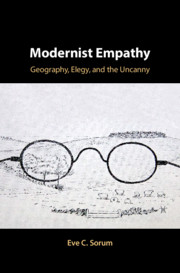Book contents
- Modernist Empathy
- Modernist Empathy
- Copyright page
- Dedication
- Contents
- Illustration
- Acknowledgments
- Chapter 1 Modernizing Empathy, Locating Loss
- Chapter 2 Disorientation, Elegy, and the Uncanny
- Chapter 3 Disorienting Empathy
- Chapter 4 Elegizing Empathy
- Chapter 5 Uncanny Empathy
- Conclusion Performing Empathy?
- Notes
- Bibliography
- Index
Chapter 1 - Modernizing Empathy, Locating Loss
Published online by Cambridge University Press: 11 June 2019
- Modernist Empathy
- Modernist Empathy
- Copyright page
- Dedication
- Contents
- Illustration
- Acknowledgments
- Chapter 1 Modernizing Empathy, Locating Loss
- Chapter 2 Disorientation, Elegy, and the Uncanny
- Chapter 3 Disorienting Empathy
- Chapter 4 Elegizing Empathy
- Chapter 5 Uncanny Empathy
- Conclusion Performing Empathy?
- Notes
- Bibliography
- Index
Summary
I find it hard to imagine that anyone who has picked up my book, with its clear literary focus, can read that statement from Marcel Proust’s final volume of In Search of Lost Time and not feel a thrill of recognition and, if not agreement, at least hope. The vision that Proust accords art (here he means literature, specifically) illuminates the singularity of every experience; literature reveals the differences, rather than the unity, between our understandings of the world. Art, in this formulation, occupies a privileged position as the catalyst to what could only be called an empathetic imagination, where we can “know what another person sees.”
Information
- Type
- Chapter
- Information
- Modernist EmpathyGeography, Elegy, and the Uncanny, pp. 1 - 27Publisher: Cambridge University PressPrint publication year: 2019
